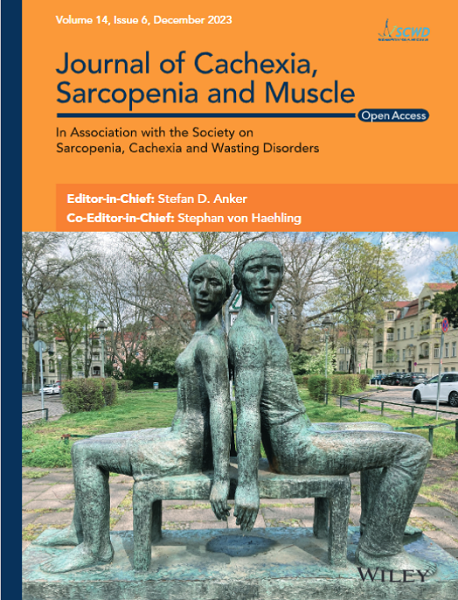The Effects of Vitamin D on Muscle Strength Are Influenced by Testosterone Levels
Abstract
Background
Although the role of vitamin D receptor (VDR) in muscle mass and strength is well established, the effects of vitamin D (VD) on muscle remain controversial due to various factors. Herein, the influence of sex on the effects of VD on muscle function and the underlying reasons was explored.
Methods
Male and female Sod1 gene knockout (SKO) mice, serving as a model for skeletal muscle atrophy, were treated with the VD active analogue calcipotriol, and RNA sequencing was employed to investigate this potential signalling pathway. The National Health and Nutrition Examination Survey (NHANES) database was utilized to explore whether testosterone affects the correlation between VD and grip strength in human participants. Experiments involving C2C12 cells and castrated male mice subjected to immobilization were conducted to demonstrate the enhancing effects of testosterone on VD function.
Results
In male SKO mice, Vdr expression in the gastrocnemius muscle was positively correlated with grip strength (R2 = 0.4689, p < 0.001), whereas no such correlation was identified in female mice. At 28 weeks of age, both male and female SKO mice exhibited significantly reduced grip strength compared to Sod1 wild-type (SWT) mice, and calcipotriol restored grip strength in male SKO mice (SWT-veh: 0.0716 ± 0.0006, SWT-cal: 0.0686 ± 0.0010, SKO-veh: 0.0601 ± 0.0010, SKO-cal: 0.0703 ± 0.0007; p < 0.05). Calcipotriol increased muscle protein synthesis and mitochondrial biogenesis while decreasing inflammation and atrogenes in gastrocnemius muscle of male SKO mice. However, the effect of calcipotriol on muscle was not significant in female SKO mice. Compared to wild-type mice, both male and female SKO mice exhibited reduced levels of 1,25(OH)2D3 due to ROS-induced hepatic CYP3A4 overexpression, thereby excluding the influence of baseline VD levels. The serum 25(OH)D3 and testosterone interactively affect grip strength in adults (p < 0.05). Using C2C12 cells differentiated into myotubes, testosterone significantly enhanced the inducing effects of VD on VDR, androgen receptor (AR), P-AKT, PGC1α, Beclin1 and LC3B. Calcipotriol improved grip strength in sham-operated mice but had a negligible effect on grip strength in castrated mice. However, a significant improvement in grip strength was observed in castrated mice following testosterone restoration (p < 0.05).
Conclusions
This study demonstrates the existence of sex heterogeneity in the effects of VD on muscle and that testosterone enhances the strength and molecular responses to VD. These findings underscore the importance of considering testosterone levels when utilizing VD to enhance muscle strength.


 求助内容:
求助内容: 应助结果提醒方式:
应助结果提醒方式:


